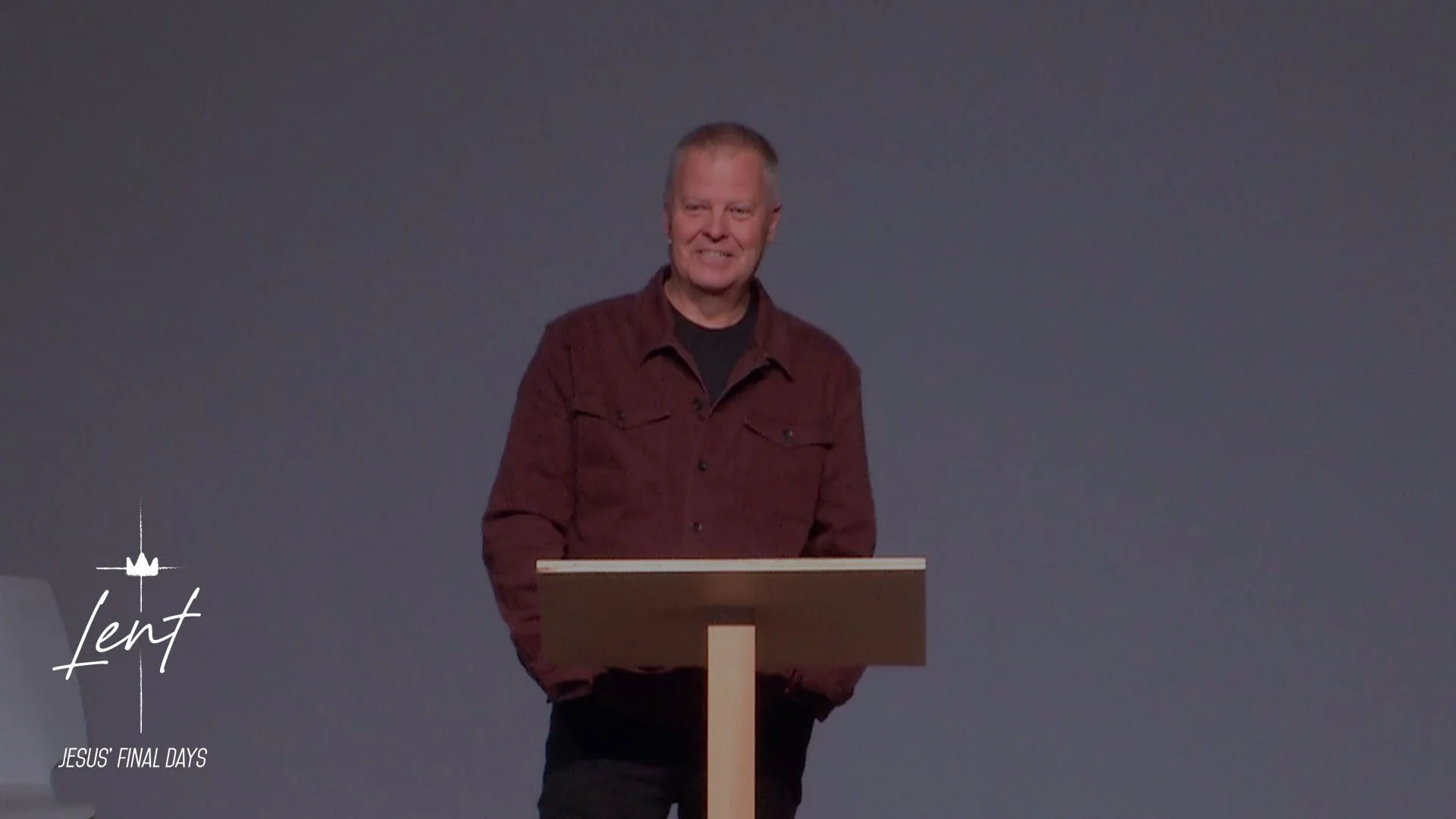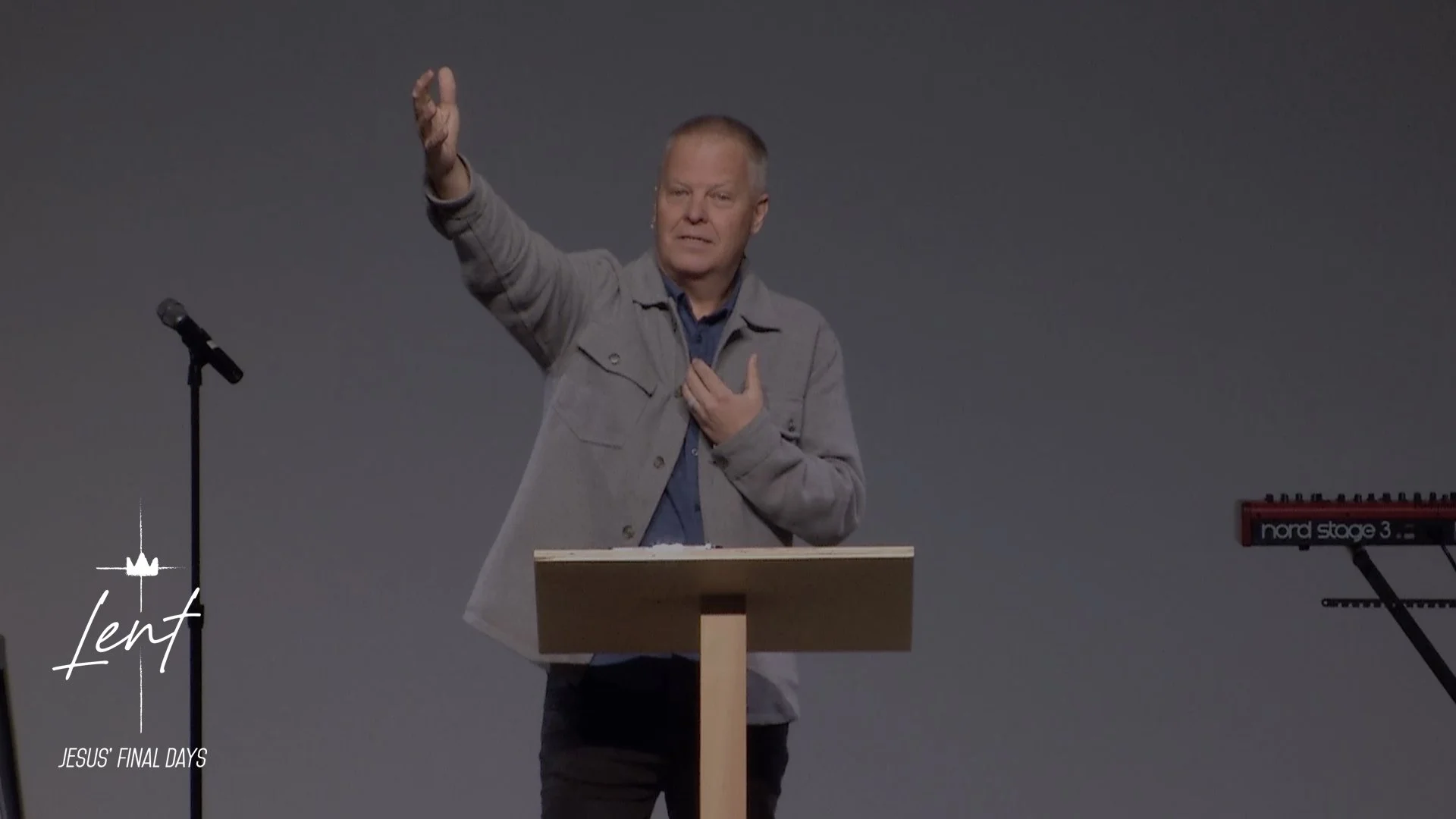Lent Fast
During this past season of Lent, we had the opportunity to join together in fasting, prayer, and pursuing Jesus as a united church body. Every Monday in March, we fasted together. Pastor Dale guided us in a weekly podcast to encourage us and focus our prayers. There were also videos from Practicing the Way that went deeper into each of the focus areas of our fast. If you were able to participate with us, we hope it drew you closer to our Father and was a blessing to your spirit.
Lent: Jesus’ Final Days | Feb. 18, 2024
What a blessing to be together this first Sunday of Lent. As a part of the teaching for this season, Pastor Dale brought us back to the book of Mark as we looked at one of the most difficult chapters in the New Testament, Mark 13. From beginning to end, the text references ancient Jewish history and Jewish ideas and presents them in a non-linear way which for the modern reader, can be quite hard to understand. That said, as followers of Jesus, we shouldn't disregard this chapter as it is a source of many ideas about the second coming of Jesus.
Pastor Dale outlined five threads the scripture contains:
There are prophecies of the destruction of Jerusalem. (Mark 13:1-2, 14-20)
There is a warning of persecution to come. (Mark 13:9-13)
There are warnings of the dangers of the last days. (Mark 13:3-6, 21-22)
There are warnings of the second coming. (Mark 13:24-27)
There are warnings of the necessity to be on the watch. (Mark 13:28-37)
If we are living in the shadow of eternity with the constant possibility of the intervention of God, if the times in the seasons are known, only to God, there is the necessity ever to be ready. Our impatience attacks watching, guarding, and listening. We drift to things.
“But seek first his kingdom and his righteousness, and all these things will be given to you as well. Therefore do not worry about tomorrow, for tomorrow will worry about itself. Each day has enough trouble of its own.” - Matthew 6:33-34 NIV
When we seek God first, we become watchers. We are guarding. We are alert. That is what this season of Lent can do for us. Together we can pay attention to what we hunger for. Together we can confess and turn from the things we consume, thinking it will sustain us. Together we can encourage each other and remind each other to stay with Jesus.
Lent: Jesus’ Final Days | Feb. 25, 2024
It was a joy to be with you this morning as Pastor Rob continued our series in the book of Mark. Today we looked at Mark 14:1-11. In verses 1-2 and 10-11, we see the plot put together to condemn and crucify Jesus. When we look at what Mark puts in the center of the story, we see a beautiful story of the anointing of the King. This moment shouts to the reader a reminder that we are to live in the moment, to remember what Christ did for us, and to put Him first and then let everything else flow out from there. Then, to reflect on how we can share his love and this message to others.
Lent: Jesus’ Final Days | Mar. 3, 2024
This morning we were blessed to hear from Pastor Danny as he taught on communion and The Lord's Supper. At Calvary, we receive the communion elements in our response time each week. We come forward and someone places the small cup in our hands and says something like, "This is the body and blood of Jesus given for you."
While many of us would not describe the cup of juice and the small wafer as a meal or even a snack, it's actually much, much more than that. It is a feast, a feast of rich meaning and delicate symbolism.
1. The Lord’s Supper connects us to the past. It’s an invitation to remember. When we take the cup, when we eat the bread and drink the juice we are transported to the table with Jesus, where he gives the command to carry this act forward in remembrance of him.
2. The Lord’s Supper connects us to God. When we take this cup, when we remember that Jesus is our redemption, our deliverance, our access to the life and goodness of God, we are reminded that in Jesus' victory, God is no longer separate. We are now reconciled and connected to God.
3. The Lord’s Supper connects us to a future hope when Jesus will gather his followers from every tribe, every nation, every language and all will once again have full, unrestricted access to the tree of life and we will feast together with Jesus for eternity.
4. The Lord’s Supper connects us to each other. We receive direction from Paul in 1 Corinthians 11, "So then, my brothers and sisters, when you gather to eat, you should all eat together."
We are to celebrate communion, our connection to the past, our connection with God, our connection to a future as a unified people and as a healthy church body.
Lent: Jesus’ Final Days | Mar. 10, 2024
Today Pastor Dale continued our series looking at Jesus' final days in Mark 14:27-32. In the passage we see Jesus praying with His Father. Jesus is about to step into the ultimate sacrifice, fulfilling God's will to reconcile humanity to Him through His son. While it's reasonable to wonder why God wanted Jesus to die the way he did, perhaps we should ask why God wanted Jesus to live the way he did.
What God wanted for Jesus, He wants for all of us, to live in the reality of God‘s kingdom. God wanted Jesus to live the kindness that is at the core of the divine identity, while also living as one of us facing all the trials and troubles that fragile human flesh must face. God wanted Jesus to live this way so that we could see what life in the kingdom of God, which is a truly human life, is all about. And not simply to show us, but also to forge a path into the kingdom and give us a way to be what God created us to be.
Jesus lived the life our Father willed for Him including death on the cross, all because His Father, our Father, IS love. When we exist in the love that is God, it is not just being at a place where we can say “It is truly well with my soul. It is love that makes it possible to join Jesus in saying “not what I will, but what you will.” It is from that place that dead things come to life.
Lent: Jesus’ Final Days | Mar. 17, 2024
What a blessing to come together with you this morning as our friend Pastor Steve continued our series looking at Jesus' final days in Mark 14:43-63. In the passages, we see Jesus experience the deep human pain of betrayal and abandonment. Judas betrays Jesus. All of Jesus' disciples, despite having declared their love and loyalty to Jesus, fall away and leave Jesus to go to the cross beaten, violated, naked, abandoned, and alone.
Jesus takes the betrayal he experiences, the pain he experiences, absorbs the trauma into his body and takes it to the cross where everything that he takes there gets transformed. Jesus chooses love over bitterness, vulnerability over protection, and forgiveness over retaliation. Because of Jesus, because of His great sacrifice, and the power of His resurrection, we have a promise that in our places of deepest hurt, healing is possible.
Whatever we bring to the Cross of Jesus, He is able to heal, redeem, restore, transform, and give it new life. We can bring all of our emotions, our burdens, our hurts, and entrust them to Jesus. Pastor Steve gave us three practical steps we can take to begin this healing process.
Bring your full self to the cross today. Bring everything you're carrying to Jesus, every wound, every fear, every worry, and bring it to the one who covers it all.
Don't give up on community. Welcome one another, encourage one another, forgive one another, show hospitality to one another.
Take a step towards healing. Some hurts require help from others. A local resource is the Christian Counseling Center (cccsanjose.com).
Lent: Jesus’ Final Days | Mar. 24, 2024
Today marks the beginning of Holy Week with Palm Sunday. It’s the day we remember Jesus riding into Jerusalem on a donkey, where the streets were lined with people shouting hosanna, save us. Palm Sunday is a day we're reminded of the choice Jesus gives us; a choice to accept him as Lord and crown Him as King, or deny Him and reject Him all together.
As Pastor Danny took us through Mark 14: 53-72, we see two things in this set of verses; Jesus is giving up his life and Peter is trying to save his life. Jesus is on trial and the high priest asks Jesus if he is the Messiah. Jesus responds "I am". Jesus, acknowledging he is the true Messiah and King, knows it will get him killed. Peter is watching from the outside. As Jesus is laying down his life, Peter denies knowing him in an effort to save his own life.
Peter’s denial of Jesus is at its core breaking the connection of a relationship. Mark highlights the disappearance of Peter in his gospel but if we look at the other gospel writers we see in Peter a couple things that happen when we are the betrayer.
Peter is overcome with guilt and shame.
Peter numbs the feelings by going back to work. He returns to his old way of life.
And then hope breaks through. In John 21:4-7, we see Jesus on the beach where he meets with Peter and the other disciples and makes them breakfast. They share a meal together and three times Jesus asks Peter if he loves him. Three times Peter confesses his love and in doing so, Peter is restored to new life.
Palm Sunday is an invitation to all of us and in Peter, we see how the response to the invitation plays out. It’s an invitation to make a choice - a choice to accept Jesus as Lord and crown Him as King, or deny him and crucify him. Peter denied Jesus, faced the spiritual death marked by guilt and shame and the need to try and deal with it by covering it up or numbing it. But in his restoration through Jesus, in his acceptance of Jesus as King he experiences the hope that restoration brings. That hope is marked by full transformation, full of purpose, and full of peace.
Jesus offers everyone the same choice. No matter how you’ve betrayed him, he sits on the beach calling. That same restoration is available to anyone who chooses to receive it. Transformation, purpose, and peace are available in part now, and the beauty of Palm Sunday is it’s a promise that it will be complete when he returns again.










